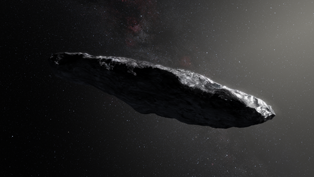Resume Reading — The Trouble with Counting Alien Civilizations
Close
You’ve read 1 of 2 free monthly articles. Learn More.
Close
Life on Earth is a sketchy guide to intelligent life in the cosmos.
By Caleb Scharf
June 24, 2020
You might imagine that in the midst of a global pandemic and all of its social and economic fallout that our minds would be laser-focused on immediate, Earthly woes. But apparently not entirely. A case in point is the recent virus-like spread of news headlines to the effect that there should be “at least 36 alien civilizations” in our galaxy. Not 10, not a thousand, or a billion, but 36. There you have it, three dozen other sets of intelligent life dotting our cosmic neighborhood, so stick that in your pipe and smoke it.
It’s at times like these that you can almost hear the collective sigh from astronomers and astrobiologists who realize that they have to roll up their sleeves to gently, politely, carefully try to explain why these headlines are, shall we say, of the same nature as the matter that emanates from ruminant digestive systems.
Charting the development of civilizations as a simple function of the age of life on a planet seems positively ludicrous.
But I’m getting ahead of the arc here. Right now, in science, the question of whether we are alone in the universe or not is crying out for some kind of answer. Perhaps more so than at any time in recorded human history. There is a confluence of reasons for this sense of urgency and importance. For one thing we now know that planets are fantastically abundant in the universe and are potentially the best incubators of the complex chemistry associated with life as we understand it. We’re also getting closer to being able to evaluate some of these other worlds, these exoplanets, with a fidelity of data that could reveal rudimentary signatures of life, through its chemistry and the changes it wreaks on a planetary environment. Simultaneously there is a resurgence of interest in the quest to look for evidence not just of life but of technological life; either emitting structured information in radio waves or laser pulses, or sculpting its surroundings in ways that reflect intent and sophistication.
Consequently, many scientists are actively looking for ways to incorporate even the tiniest hints or clues that come from new data or insights to see if we can’t come up with statistically meaningful statements about the likelihood of life elsewhere—be it microbes or civilizations. In that sense (and I count myself in this category), we are the kids shaking the nicely wrapped presents to see if we can tell what we’re getting. The problem is that the wrapping may not come off for a long time, and that all of our guesses rest on fundamental assumptions—on prior knowledge or expectations that are themselves possibly highly biased and unusual.
It is those assumptions that gets us back to the headline-grabbing statements about 36 alien civilizations. These headlines are based on a new study by two respectable scientists, Tom Westby and Christopher Conselice at the University of Nottingham in the United Kingdom. What these researchers actually say is that, based on a very specific calculation (that I’ll come to shortly) there is an argument to be made for the possible existence of anywhere between about half a dozen to over 200 civilizations capable of communication in our galaxy.
Arriving at those figures involves a number of steps. Some are to do with a detailed astrophysical analysis to evaluate the likely number of stars and planetary systems of particular ages and elemental compositions. It turns out, for example, that stars in our galaxy are, on average, about 9.8 billion years old—not surprisingly matching the age of the era during which most stars were formed.
But other steps involve assumptions that are extremely tricky to justify, and highly contentious. This is not to unduly criticize the study, because it is entirely open and honest about these assumptions and is a stimulating contribution to these questions. Nonetheless, the assumptions are the weak link, as are similar ones in almost every paper ever written on this topic.
In this case two “principles” are suggested: a Weak Astrobiological Copernican Principle and a Strong Astrobiological Copernican Principle. The weak one is a scenario where, because of what we witness on Earth, it is assumed that planets only form intelligent life after they reach an age of 5 billion years. The strong one says that intelligent life has to form between 4.5 and 5.5 billion years into a planet’s existence, as it seems to have on Earth. The justification for choosing these figures is that if Earth is not special (as the modern form of the Copernican Principle would have it) then we would expect other life-bearing worlds to follow suit on average. The estimated number of alien civilizations derives from these constraints, after combination with the computed statistics of exoplanets and their properties.
This is also precisely where scientific feathers get righteously ruffled. The most direct technical rebuttal to these proposed assumptions and principles is that we on Earth suffer from powerful “winner bias.” If, for example, intelligence came along much earlier or much later it would look at its history and also select its time of existence as “the most likely.”
The impetus of life toward intelligence over evolutionary time is, at best, a hypothesis.
That’s a thorny problem. But we already knew it was a problem, and there has been sophisticated work done to deploy the tools of so-called Bayesian probability to try to account for precisely this kind of bias. The results of all of those works tell us that we are truly, quantifiably ignorant about life’s most probable trajectory, and that our Earth-based data points have very limited discriminatory power.
The other rebuttal, that is in many ways far more interesting, is to do with our impressive ignorance about the very nature of life itself, and the nature of the phenomenon we blithely call “intelligence.” Because of that ignorance, charting the development of civilizations as a simple function of the age of life on a planet seems positively ludicrous.
What we do have is an emerging sense that life and its planetary environment are inextricably entwined. Every piece of Earth’s deep environmental history is a complicated story of the interactions and interdependencies of life and planet; of geochemistry and biogeochemistry. As a result, the trajectory of life here may only be partially reproducible anywhere else in the cosmos—even assuming the same chemical toolkit, the same information-bearing molecular structures and biochemistry, and the same rules of selection and evolution.
The nature of intelligence, or technological capacity, also tends to be conflated with the idea that life, on average, seems to become more complex over time. It has been posited that the improvements of prediction that complexity enables (the projection abilities of neural nets and brains) is one item at the root of this tendency. If an organism can guess the future better it ought to survive better. But, of course, there are living forms, from bacteria to plant life, that have remained largely unchanged for hundreds of millions, even billions, of years. If something works in biology there seems to be little need for it to change. The impetus of life toward intelligence over evolutionary time is, at best, a hypothesis.
In short, any assumptions about properties like intelligence or agency that we make based on what we currently know about life on Earth are on exceedingly shaky ground. To import those assumptions to quantitative analyses of the likelihood of civilizations elsewhere seems like a stretch in most cases. Although there is value to the intellectual exercise as preparation for when the time comes that we, perhaps, have more data to go by.
And perhaps too there is value to anything that, in the days and nights of the coming months, causes us to momentarily pause and think about the bigger picture. To find a little respite by contemplating the endlessly tumbling stories of societies and civilizations as they unfold across cosmic time.
Caleb Scharf is an astrophysicist, the Director of Astrobiology at Columbia University in New York, and a founder of yhousenyc.org, an institute that studies human and machine consciousness. His latest book is The Zoomable Universe: An Epic Tour Through Cosmic Scale, from Almost Everything to Nearly Nothing.
Lead image: Dotted Yeti / Shutterstock


















